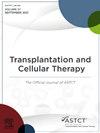儿科门诊CAR-T项目的安全性和可行性
IF 4.4
3区 医学
Q2 HEMATOLOGY
引用次数: 0
摘要
选题意义& &;嵌合抗原受体t细胞(CAR-T细胞)是一种新型的免疫疗法,涉及基因修饰的t淋巴细胞,旨在靶向肿瘤特异性抗原。在德州儿童医院(Texas Children’s Hospital),我们已经建立了基础设施,在门诊环境中支持商业化和研究性car - t细胞疗法,提高了患者的可及性和便利性。方法、干预、&;我们的CAR-T护士协调员是主要的联络人,促进检查前的测试和患者在家或在室内的教育。这个角色包括协调化疗前静脉补水的家庭保健。门诊治疗方案包括3-5天的淋巴细胞消耗化疗,随后是细胞输注和28天的监测期,每周就诊。护理人员在第0天收到一份针对患者的安全卡,上面概述了发烧监测方案(每天两次体温检查),强调不要掩盖发烧,并提供与护理团队的直接沟通渠道。对护理人员的全面培训得到了为重症护理量身定制的标准实践指南和教育途径的支持。教育护理人员了解潜在的副作用,特别是细胞因子释放综合征(CRS)和免疫效应细胞相关神经毒性综合征(ICANS),对于确保患者安全和促进及时随访至关重要。的发现,自2017年11月至2024年5月,TCH共成功进行了109次科研输注和79次CAR-T商业输注。对于商业输液,65%是在门诊进行的。我们追踪了这些患者的入院数据,发现52例患者中有25例在输注CRS后需要住院。其中CRS 1级17例,2、3级8例;其中28%的患者转至儿科重症监护病房(PICU)。重要的是,没有4级CRS录取。讨论,我们的研究结果表明,CAR-T疗法可以安全地在门诊环境中进行,可以节省成本并提高患者满意度。这个项目的成功强调了一个熟练的护理团队在管理门诊CAR-T治疗和确保患者安全方面的关键作用。本文章由计算机程序翻译,如有差异,请以英文原文为准。
The Safety and Feasibility of a Pediatric Ambulatory CAR-T Program
Topic Significance & Study Purpose/Background/Rationale
Chimeric antigen receptor T-cells (CAR-T cells) are a novel immunotherapy involving genetically modified T-lymphocytes designed to target tumor-specific antigens. At Texas Children's Hospital, an accredited Good Manufacturing Practice facility, we have established the infrastructure to support both commercial and investigational CAR-T-cell therapies in an outpatient setting, enhancing patient access and convenience.
Methods, Intervention, & Analysis
Our CAR-T nurse coordinator serves as the primary liaison, facilitating pre-workup testing and patient education at home or in-house. This role includes coordinating home healthcare for intravenous hydration prior to chemotherapy. The outpatient treatment regimen consists of 3-5 days of lymphodepleting chemotherapy, followed by cell infusion and a 28-day monitoring period with weekly clinic visits. Caregivers receive a patient-specific safety card on day zero, outlining fever-monitoring protocols (temperature checks twice daily), emphasizing not masking fevers, and providing direct communication channels with the care team. Comprehensive training for nursing staff is supported by standard practice guidelines and educational pathways tailored for critical care. Educating caregivers about potential side effects, particularly cytokine release syndrome (CRS) and immune effector cell-associated neurotoxicity syndrome (ICANS), is essential for ensuring patient safety and promoting timely follow-up.
Findings & Interpretation
Since November 2017-May 2024, TCH has successfully conducted 109 research infusions and 79 commercial CAR-T infusions. For commercial infusions, 65% were performed in the outpatient setting. We tracked admission data for these patients, revealing that 25 out of 52 patients required hospitalization post-infusion for CRS. Among those admitted, 17 presented with grade 1 CRS, while 8 experienced grades 2 and 3; 28% of these patients were transferred to the Pediatric Intensive Care Unit (PICU). Importantly, there were no grade 4 CRS admissions.
Discussion & Implications
Our findings demonstrate that CAR-T therapy can be safely administered in an ambulatory setting, offering cost-saving benefits and increased patient satisfaction. The success of this program underscores the critical role of a skilled nursing team in managing outpatient CAR-T therapy and ensuring patient safety.
求助全文
通过发布文献求助,成功后即可免费获取论文全文。
去求助
来源期刊

Transplantation and Cellular Therapy
Medicine-Hematology
CiteScore
7.00
自引率
15.60%
发文量
1061
审稿时长
51 days
 求助内容:
求助内容: 应助结果提醒方式:
应助结果提醒方式:


